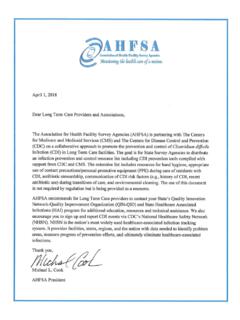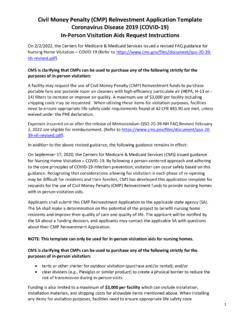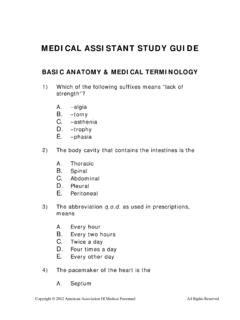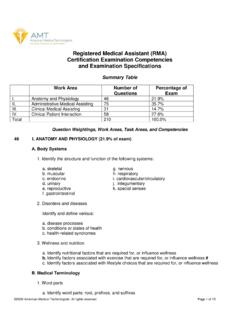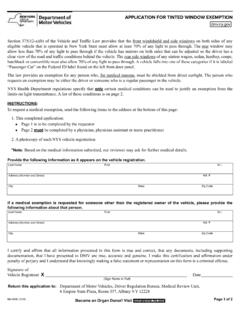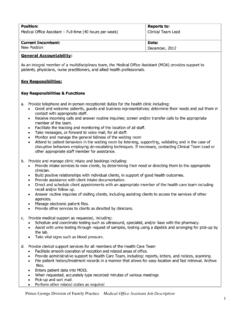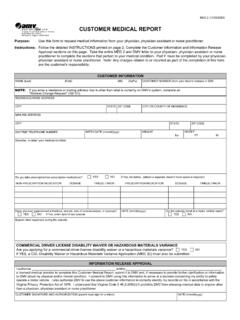Transcription of RAI Manual Guidance on Coding GG0130 Self-Care and …
1 RAI Manual Guidance on Coding GG0130 Self-Care and GG0170 Mobility Items This document was created to assist NHs in Missouri with Coding GG0130 and GG170 items on OBRA. MDS assessments not combined with a Medicare assessment. All of the Guidance contained in this document comes from the Long-Term Care Facility Resident Assessment Instrument (RAI) User's Manual Version The Guidance in the RAI Manual includes additional information about Section GG that is irrelevant for Coding GG items on OBRA assessments not combined with a Medicare assessment; that information was not included in this document. GG0130 Self-Care and GG0170 Mobility Steps for Assessment 1. Assess the resident's performance based on direct observation, incorporating resident self-reports and reports from qualified clinicians, care staff, or family documented in the resident's medical record during the three-day assessment period.
2 CMS anticipates that an interdisciplinary team of qualified clinicians is involved in assessing the resident during the three-day assessment period. 2. Residents should be allowed to perform activities as independently as possible, as long as they are safe. 3. For the purposes of completing Section GG, a helper is defined as facility staff who are direct employees and facility-contracted employees ( , rehabilitation staff, nursing agency staff). Thus, helper does not include individuals hired, compensated or not, by individuals outside of the facility's management and administration such as hospice staff, nursing/certified nursing assistant students, etc. Therefore, when helper assistance is required because a resident's performance is unsafe or of poor quality, consider only facility staff when scoring according to the amount of assistance provided. 4. Activities may be completed with or without assistive device(s).
3 Use of assistive device(s) to complete an activity should not affect Coding of the activity. 5. Refer to facility, Federal, and State policies and procedures to determine which staff members may complete an assessment. Resident assessments are to be done in compliance with facility, Federal, and State requirements. GG0130 Self-Care and GG0170 Mobility Coding Instructions When Coding the resident's usual performance, use the six-point scale, or use one of the four activity was not attempted codes to specify the reason why an activity was not attempted. Code 06, Independent: if the resident completes the activity by him/herself with no assistance from a helper. Code 05, Setup or clean-up assistance: if the helper sets up or cleans up; resident completes activity. Helper assists only prior to or following the activity, but not during the activity. For example, the resident requires assistance cutting up food or opening container, or requires setup of hygiene item(s) or assistive device(s).
4 Code 04, Supervision or touching assistance: if the helper provides verbal cues or touching/steadying/contact guard assistance as resident completes activity. Assistance may be provided throughout the activity or intermittently. For example, the resident requires verbal cueing, coaxing, or general supervision for safety to complete activity; or resident may require only incidental help such as contact guard or steadying assist during the activity. Code 03, Partial/moderate assistance: if the helper does LESS THAN HALF the effort. Helper lifts, holds, or supports trunk or limbs, but provides less than half the effort. Code 02, Substantial/maximal assistance: if the helper does MORE THAN HALF the effort. Helper lifts or holds trunk or limbs and provides more than half the effort. Code 01, Dependent: if the helper does ALL of the effort. Resident does none of the effort to complete the activity; or the assistance of two or more helpers is required for the resident to complete the activity.
5 Code 07, Resident refused: if the resident refused to complete the activity. Code 09, Not applicable: if the activity was not attempted and the resident did not perform this activity prior to the current illness, exacerbation, or injury. Code 10, Not attempted due to environmental limitations: if the resident did not attempt this activity due to environmental limitations. Examples include lack of equipment and weather constraints. Code 88, Not attempted due to medical condition or safety concerns: if the activity was not attempted due to medical condition or safety concerns. For additional information on Coding the resident's performance on the assessment instrument, refer to the Decision Tree on page GG-12. Decision Tree Use this decision tree to code the resident's performance on the assessment instrument. If helper assistance is required because the resident's performance is unsafe or of poor quality, score according to the amount of assistance provided.
6 Only use the activity not attempted codes if the activity did not occur; that is, the resident did not perform the activity and a helper did not perform that activity for the resident. - CMS videos - RAI Manual : - QIPMO webinars - Link to a training worksheet I create ? GG0130 Self-Care and GG0170 Mobility General Coding Tips When reviewing the medical record, interviewing staff, and observing the resident, be familiar with the definition for each activity. Residents with cognitive impairments/limitations may need physical and/or verbal assistance when completing an activity. Code based on the resident's need for assistance to perform the activity safely. If the resident does not attempt the activity and a helper does not complete the activity for the resident during the entire assessment period, code the reason the activity was not attempted. For example, code as 07 if the resident refused to attempt the activity; code as 09 if the activity is not applicable for the resident (the activity did not occur at the time of the assessment and prior to the current illness, injury, or exacerbation); code as 10 if the resident was not able to attempt the activity due to environmental limitations; or code as 88 if the resident was not able to attempt the activity due to medical condition or safety concerns.
7 An activity can be completed independently with or without devices. If the resident uses adaptive equipment and uses the device independently when performing an activity, enter code 06, Independent. If two or more helpers are required to assist the resident to complete the activity, code as 01, Dependent. To clarify your own understanding of the resident's performance of an activity, ask probing questions to the care staff about the resident, beginning with the general and proceeding to the more specific. See examples of probing questions at the end of this section. A dash ( - ) indicates No information. CMS expects dash use to be a rare occurrence. Documentation in the medical record is used to support assessment Coding of Section GG. Data entered should be consistent with the clinical assessment documentation in the resident's medical record. This assessment can be conducted by appropriate healthcare personnel as defined by facility policy and in accordance with State and Federal regulations.
8 GG0130 Self-Care and GG0170 Mobility Tips for Coding the Resident's Usual Performance When Coding the resident's usual performance, effort refers to the type and amount of assistance a helper provides in order for the activity to be completed. The six-point rating scale definitions include the following types of assistance: setup/cleanup, touching assistance, verbal cueing, and lifting assistance. Do not record the resident's best performance, and do not record the resident's worst performance, but rather record the resident's usual performance during the assessment period. Code based on the resident's performance. Do not record the staff's assessment of the resident's potential capability to perform the activity. If the resident performs the activity more than once during the assessment period and the resident's performance varies, Coding in Section GG should be based on the resident's usual performance, which is identified as the resident's usual activity/performance for any of the Self-Care or Mobility activities, not the most independent or dependent performance over the assessment period.
9 Therefore, if the resident's Self-Care performance varies during the assessment period, report the resident's usual performance, not the resident's most independent performance and not the resident's most dependent performance. A provider may need to use the entire three-day assessment period to obtain the resident's usual performance. Coding Tips and Examples for GG0130 Self-Care Items Some examples below describe a single observation of the person completing the activity; other examples describe a summary of several observations of the resident completing an activity across different times of the day and different days. Coding Tips for GG0130A, Eating GG0130A, Eating involves bringing food and liquids to the mouth and swallowing food. The administration of tube feedings and parenteral nutrition is not considered when Coding this activity. The following is Guidance for some situations in which a resident receives tube feedings or parenteral nutrition: If the resident does not eat or drink by mouth and relies solely on nutrition and liquids through tube feedings or total parenteral nutrition (TPN) because of a new (recent-onset) medical condition, code GG0130A as 88, Not attempted due to medical condition or safety concerns.
10 Assistance with tube feedings or TPN is not considered when Coding Eating. If the resident does not eat or drink by mouth at the time of the assessment, and the resident did not eat or drink by mouth prior to the current illness, injury, or exacerbation, code GG0130A as 09, Not applicable - Not attempted and the resident did not perform this activity prior to the current illness, exacerbation, or injury. Assistance with tube feedings or parenteral nutrition is not considered when Coding Eating. If the resident eats and drinks by mouth, and relies partially on obtaining nutrition and liquids via tube feedings or parenteral nutrition, code Eating based on the amount of assistance the resident requires to eat and drink by mouth. Assistance with tube feedings or parenteral nutrition is not considered when Coding Eating. If the resident eats finger foods using his or her hands, then code Eating based upon the amount of assistance provided.

